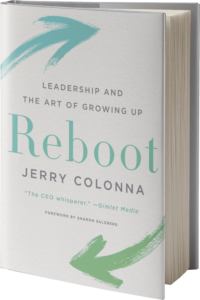
Some books leave an impression long after you close them.
“The greatest gifts of leadership are its challenge to remember who we are and the opportunity to become the grownups we were meant to be.” – Jerry Colonna, leadership coach, author, mensch.
One of the best books I read last year was “Reboot”, an honest—often painfully honest– look at life and leadership by legendary business coach Jerry Colonna.
Colonna (no relation to my wife) left a highly successful career as a venture capitalist to in essence save his own life. He just wasn’t happy and it was killing him—literally.
What followed is a story of personal growth and “radical self-inquiry” that ultimately helped Colonna overcome his demons and re-invent himself as a go-to coach for entrepreneurs and CEOs.
“Reboot” is the kind of book that stays with you because of its rawness and honesty.
Colonna learned that the best path to happiness was to understand yourself and to confront the issues that keep so many of us stuck in a rut.
Sometimes that rut looks like failure and other times it looks like success with all the trappings—money, fame, titles, toys etc., but it’s still a soul-sucking pit if it drains you.
Colonna’s argument and it’s a good one is that you can’t be an effective leader until you know yourself.
Another favorite author of mine, the great marketing mind Seth Godin touches on a similar concept of honesty when he writes about leadership.
Godin believes that are two elements to successful leadership: “a willingness to be wrong and an eagerness to admit it.”
I just love that sentiment—because within that thought is the potential for growth and change.
And as yet another author of some renown put it: “progress is impossible without change and those who cannot change their minds cannot change anything.”
That’s George Bernard Shaw for those keeping score at home—and what a profound quote that is.
And it occurred to me as we enter another local and national election cycle that politicians are terrible at admitting that they got anything wrong.
Changing their minds is looked at as a weakness and you run the risk of being labeled a ‘flip-flopper’ or worse.
How tragic it is when you think about it.
Because progress is indeed impossible without change and a willingness to be wrong.
That’s true in politics and it’s true in business and it’s true in the non-profit world and it’s true in science and every other endeavor that has the potential to improve our world.
As Colonna says, we are given the opportunity to be the grownups we are meant to be, but only if we are willing to constantly examine our beliefs.
I recently had a great conversation with a new friend who is an entrepreneur who has had great success in a tough industry that I know fairly well—consumer products. We discussed what it takes to succeed, all the fires you have to put out, all the landmines you have to avoid and all the trap doors you will fall through because it is inevitable that you will. There is no such thing as an overnight success or a friction less glide path to success.
Yet we must try.
We must try if we are to progress. We must be willing to make mistakes too so we can learn from them and build a better future.
In the book Start Up Nation, which details Israel’s amazing entrepreneurial ecosystem, the authors describe how the Israeli mentality embraces failure—almost requires it—because investors and leaders there know that failure informs and strengthens. The old adage “what doesn’t kill me will only make me stronger” is true.
In a recent blog we talked about the upcoming campaign and predicted seeing the typical vapid messaging we always see—-“all development is bad, all developers are bad, my opponent is owned by the developers therefore he or she is bad.”
Every candidate has a plan to tame traffic (that we will never see), they are all against crime and for good schools and low taxes. They are for motherhood, apple pie and they love the environment.
Great.
But wouldn’t it be nice if we had leaders who told us what they’ve learned and who they are as people rather instead of just listing or in some cases manufacturing a resume?
Wouldn’t it be nice if they said they want to unite not divide and had an actual plan to try and do so?
Wouldn’t it be refreshing if they leveled with voters and shared with us their human stories and unique experiences which makes them qualified to lead our cities and our nation?
A guy can dream can’t he?
A good question to ask candidates if they show up at your door is; what have you failed at and what have you learned as a result?
It may give you a glimpse into who these people really are—certainly more so than the same tired messages we hear every cycle.




 Editor’s note: This will be our last post of 2017. We thank you for reading, commenting, sharing, agreeing and disagreeing. And we wish you and yours a happy, healthy holiday season and New Year. See you in 2018.
Editor’s note: This will be our last post of 2017. We thank you for reading, commenting, sharing, agreeing and disagreeing. And we wish you and yours a happy, healthy holiday season and New Year. See you in 2018.







 The lineup is set.
The lineup is set.